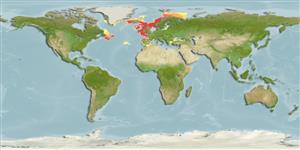Preferred temperature (Ref.
115969): 4.6 - 11.3, mean 7.7 (based on 438 cells).
Phylogenetic diversity index (Ref.
82804): PD
50 = 0.6250 [Uniqueness, from 0.5 = low to 2.0 = high].
Bayesian length-weight: a=0.00389 (0.00241 - 0.00628), b=3.06 (2.92 - 3.20), in cm Total Length, based on LWR estimates for this species & (Sub)family-body (Ref.
93245).
ระดับชั้นอาหาร (Ref.
69278): 4.4 ±0.2 se; based on diet studies.
ความสามารถในการกลับคืนสู่ปกติ (Ref.
120179): ขนาดกลาง, เวลาต่ำสุดที่จะทำให้ประชากรเพิ่มขึ้นเป็น 2 เท่าใช้เวลา 1.4 - 4.4 ปี (K=0.12; tm=5-6; tmax=25; Fec=60 million).
Prior r = 0.55, 95% CL = 0.36 - 0.82, Based on 9 full stock assessments.
Fishing Vulnerability (Ref.
59153): Very high vulnerability (77 of 100).
Climate Vulnerability (Ref.
125649): Moderate vulnerability (38 of 100).
